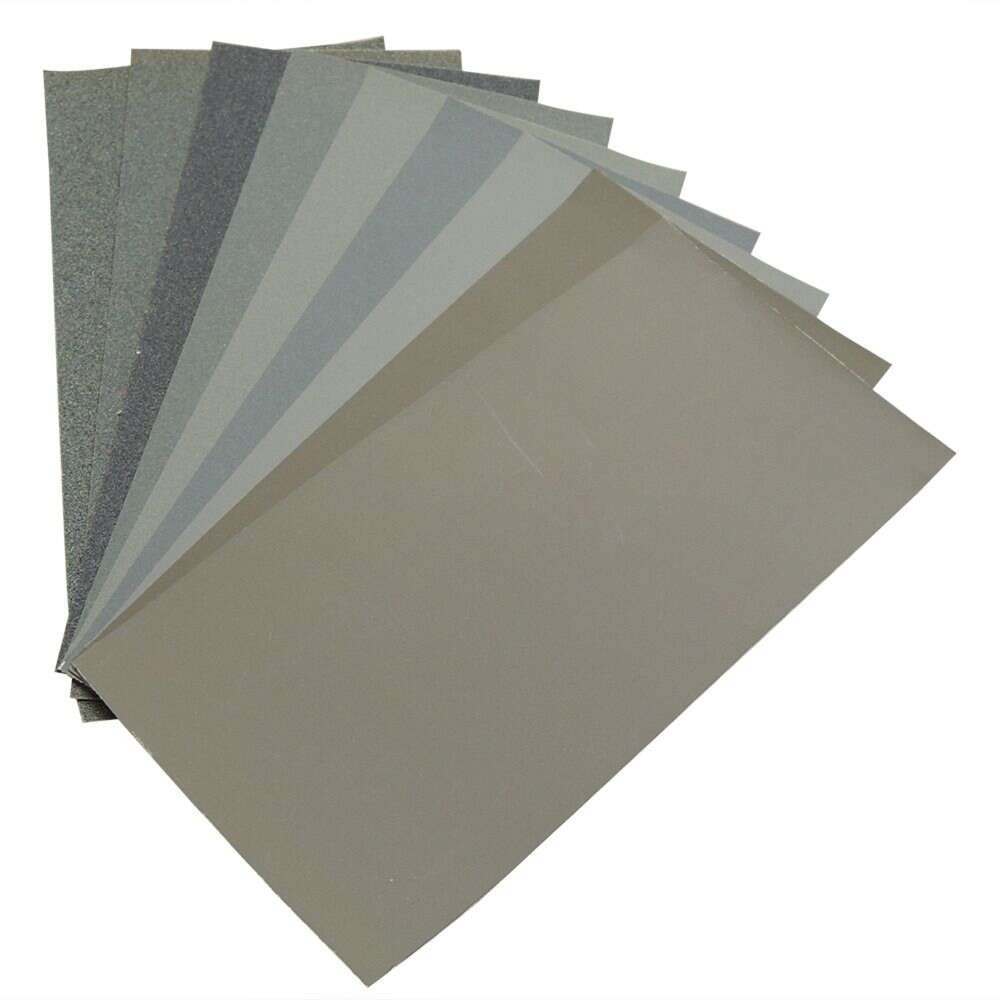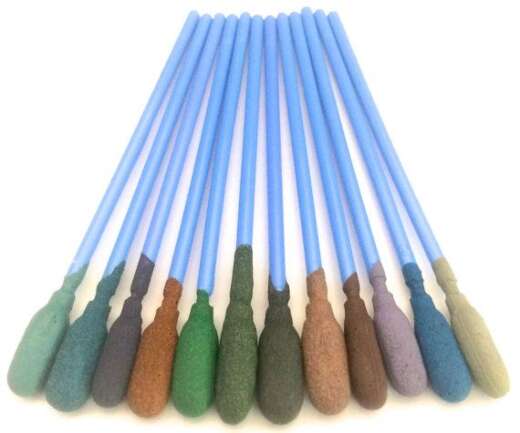Micro-Mesh Regular Sheet
Micro-Mesh™ Regular Sheet (silicone carbide grit with standard backing), the standard grade of Micro-Mesh used for polishing and cleaning paints, wood and most metals and polymers. It is used to remove material, produce a uniformly smooth surface and polish a surface to a high gloss finish. Available in grades 1500 to 12000 (30 to 2 microns).
Micro-Mesh™ Regular Sheet (silicone carbide grit with standard backing), the standard grade of Micro-Mesh used for polishing and cleaning paints, wood, and most metals and polymers. It removes material, produces a uniformly smooth surface, and polishes it to a high gloss finish. Available in grades 1500 to 12000 (30 to 2 microns).
Micro-Mesh may cost more than ordinary sandpaper, but it produces finishes 10 to 20 times finer. Micro-Mesh can be used wet or dry. By beginning with the coarser grits (1500–2400) and successfully polishing with the finer grits (3200–12000), you can produce mirror finishes on a wide variety of surfaces.
The Micro-Mesh Difference
Micro-Mesh is manufactured using Ultra-Flex technology. Each type is long-lasting, cushioned, extremely flexible, and reusable. The Ultra-flex properties of Micro-Mesh allow it to conform to shapes conventional products cannot, giving you additional finishing options.
Micro-Mesh sheets are made with large, very uniform crystals that recede into the Ultra-Flex matrix as pressure is applied, allowing the crystal tips to all line up so they are level with the part being polished. This technology provides a more brilliant, consistent finish.
Ultra-Flex technology reduces crystal fracturing, making it a long-lasting, high-quality abrasive like no other on today’s market. It also reduces heat generation that can wear out the abrasive crystals and cause orange peel, pitting or other surface imperfections in the polished part.
Conventional sandpaper is designed to be aggressive so that it will dig deeply. In its manufacture, the crystals are electrically charged so that they will stand up. They are locked into a hard resin, and when you apply the paper to a surface, it will tear in and remove the substrate of the material you are sanding. The crystals cut in a negative raking motion, leaving inconsistent scratch patterns.
Micro-Mesh does the opposite. The backing is durable cloth to which an ultra-flexible cushioning layer is applied. This cushioning layer will determine how far forward you can push crystals before they penetrate the cushioning layer. On top of this layer, we have a very resilient glue, not a hard resin, but a completely flexible glue that will hold the crystals while allowing them to move and rotate. The crystals can turn in any direction without coming loose. When you start to apply pressure to sand with Micro-Mesh, the crystals will go into the cushioning layer while beginning to cut a bit. If you push harder, they will go further into the cushioning layer, which is a safety valve. It determines how much pressure you can exert in a downward direction. Instead of a deep scratch that sandpaper makes, Micro-Mesh produces a refined scratch close to an RMS of 1.0. (RMS is a measurement of surface roughness that is calculated as the Root Mean Square of a surface’s measured microscopic peaks and valleys.) The cushioning layer also allows the crystals to cut with a planing motion that leaves an extremely consistent scratch pattern and allows you to achieve extraordinary gloss levels.
Where conventional abrasives will take surfaces down 2 or 3 thousandths (.002 or .003), Micro-Mesh will take them down one ten-thousandth (.0001) or less.
Micro-Mesh Grits
| Grit Conversion Chart | |||
| Micro-Mesh Grit | ANSI or CAMI USA | FEPA or Europe | Micron |
| P120 | 125 | ||
| 120 | |||
| P150 | 100 | ||
| 150 | |||
| 180 | P180 | 80 | |
| 200 | P220 | 65 | |
| 60 MX | P240 | 60 | |
| 80 MX | |||
| 100 MX | P280 | ||
| 120 MX | P320 | 52 | |
| 240 | 50 | ||
| 150 MX | 280 | P360 | 45 |
| P400 | 42 | ||
| P600 | 40 | ||
| 1500 | 400 | 30 | |
| P800 | |||
| P1000 | 20 | ||
| 1800 | 600 | 15 | |
| 2400 | |||
| P2000 | 10 | ||
| 3200 | 1200 | ||
| 3600 | 1350 | 8 | |
| 4000 | 1500 | 5 | |
| 6000 | 4 | ||
| 8000 | 3 | ||
| 12000 | |||
Download a complete Grit Conversion Chart.
Recommended Uses
Use the sheet alone without water or other lubricating fluid on paint surfaces. For other surfaces, use water as a lubricant to extend abrasive life and cool the work surface.
Keep Micro-Mesh sheets clean; contamination can cause scratches. When finished, rinse Micro-Mesh sheets, air dry them, and return them to their original packaging. Micro-Mesh is reusable!
Use only micro-fiber cloths for wiping. Keep the sheets clean, wash them in warm soapy water, rinse, dry, and return them to the package.
Use only light pressure when polishing or abrading surfaces. Remember the cushioned abrasive cuts with the abrasive crystal tips. The sharp cutting edges float on a resilient matrix. Extreme pressure pushes the tips back into the matrix, rendering them ineffective and resulting in surface smearing, burning, and possible orange peel and distortion.
Unacceptable Cleaning Materials
Paper towels or other paper products
Shop towels or synthetic fiber fabrics
Commercial window cleaners
Any product containing ammonia or alcohol
Clean the work surface between each step, especially in cracks and crevices. Flush the surface several times with deionized or distilled water to remove dust and dirt before touching it with anything. Clean abraded particles from the workpiece by rinsing and then drying and inspecting.
Inspect the working surface between steps with a bright light to ensure you are removing the previous scratch pattern before continuing. Using Micro-Mesh with water and a few drops of Picture CleanGel will generally result in less effort having to be used and a slightly better finish. Only use enough water to provide lubricity to the surface, but not so much that poor contact is made with the workpiece.
DO NOT wear out one of the meshes by trying to make it do too much work on your first step. If your estimated damage is not readily removed, go immediately to the next coarser mesh. Removing the initial damage with the sandpaper series will take up 85% of the restoral time. The Micro-Mesh series and the buffing procedures will take as little as 15% of the time. DO NOT skip steps.
Work an area slightly larger with each step to blend. Working one small area on a highly curved section could create flat spots or distortion.
Warranty
IMPORTANT NOTICE: Natural Pigments and Micro-Surface Finishing Products, Inc. MAKES NO WARRANTIES, EXPRESS OR IMPLIED, INCLUDING, BUT NOT LIMITED TO, ANY IMPLIED WARRANTIES OF MERCHANTABILITY OR FITNESS FOR A PARTICULAR PURPOSE. The user is responsible for determining whether this product is fit for a particular purpose and suitable for the user’s application method.
LIMITATION OF REMEDIES AND LIABILITY: If this product is proven defective, THE EXCLUSIVE REMEDY, AT OUR OPTION, SHALL BE TO REFUND THE PURCHASE PRICE OF OR TO REPAIR OR REPLACE THE DEFECTIVE PRODUCT. We shall not otherwise be liable for loss or damages, whether direct, indirect, special, incidental, or consequential, regardless of the legal theory asserted, including negligence, warranty, or strict liability.
| SKU | 657-M |
|---|---|
| Vendor | Micro-Surface Finishing Products |
| Processing Time | Usually ships the next business day. |









